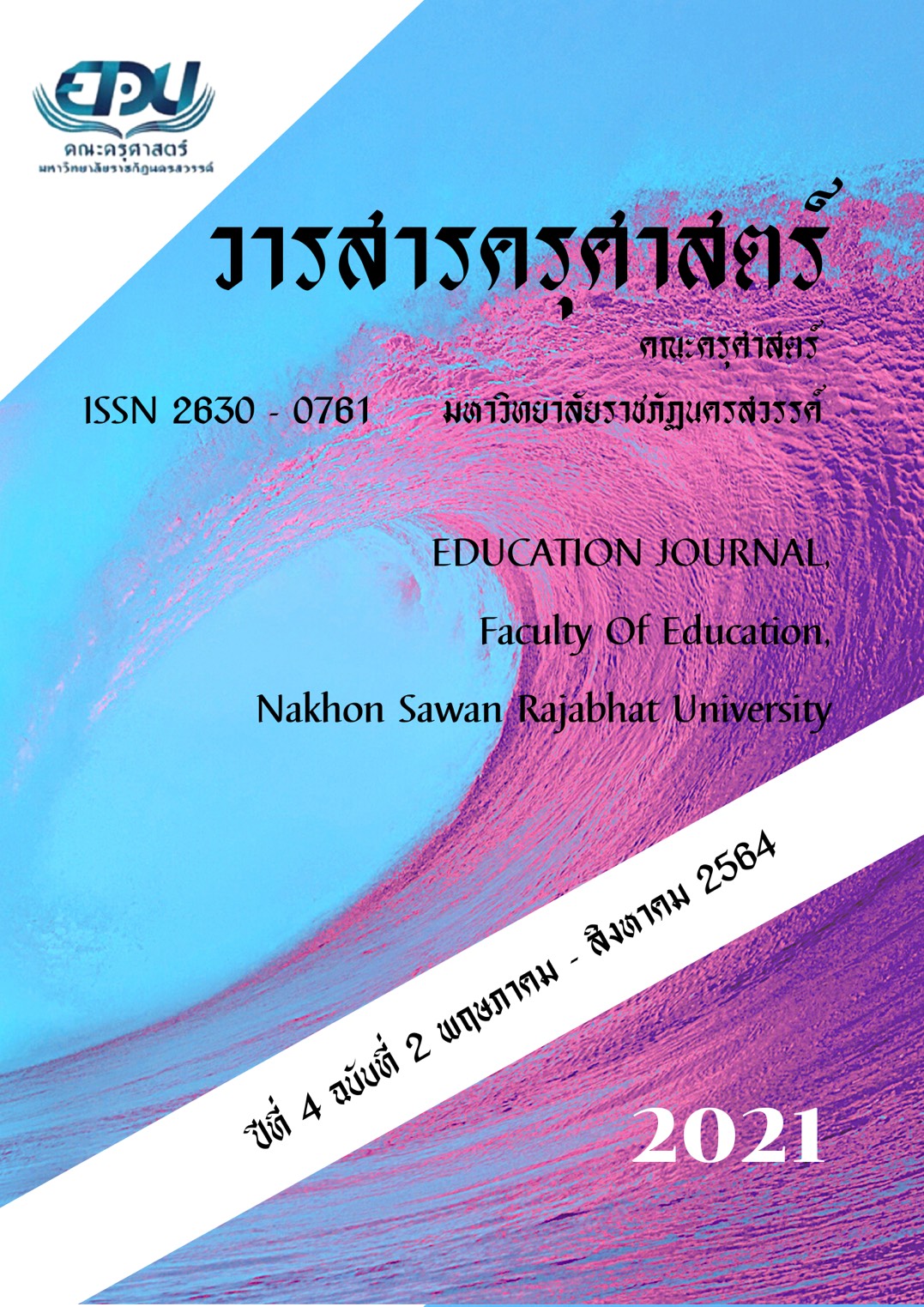Attributes of Leadership of Educational Administrators
Main Article Content
Abstract
Proficient educational management depends mainly on the knowledge, ability, and leadership of educational administrators, which plays a role in the administration in general administration, personnel management, budget management, and academic administration. The leadership attributes in educational administrators include decisions, participation, planning, teamwork, and communication. These attributes affect the followers to change for productive performance, leading to accomplishment by goals. As a result, educational administration becomes the most effective and efficient.
Downloads
Download data is not yet available.
Article Details
How to Cite
เพชรสมบัติ ร. (2021). Attributes of Leadership of Educational Administrators. Education journal Faculty of Education, Nakhon Sawan Rajabhat University, 4(2), 100–105. retrieved from https://so02.tci-thaijo.org/index.php/edunsrujo/article/view/250350
Section
Research Articles

This work is licensed under a Creative Commons Attribution-NonCommercial-NoDerivatives 4.0 International License.
References
บรรณานุกรม (Reference)
จรูญ เคหา. (2554). คุณลักษณะของผู้บริหารโรงเรียนที่ส่งผลต่อการประกันคุณภาพภายใน
สถานศึกษาด้านผู้เรียน สังกัดสำนักงานเขตพื้นที่การศึกษาประถมศึกษา ประจวบคีรีขันธ์
เขต 1. (วิทยานิพนธ์ปริญญามหาบัณฑิต, มหาวิทยาลัยราชภัฏเพชรบุรี).
พิมลพรรณ เพชรสมบัติ (2557). การพัฒนารูปแบบภาวะผู้นำของผู้บริหารมหาวิทยาลัยเอกชน
ในกรุงเทพมหานคร.บทความในรายงานการประชุ ม วิชาการระดับชาติ เบญจมิตรวิชาการ
ครั้งที่ 4. มหาวิทยาลัยราชพฤกษ์ วันที่ 25 เมษายน 2557
ลัดดาวัล พันตะคุ. (2557). คุณลักษณะที่พึงประสงค์ของผู้บริหารสถานศึกษาสังกัดสำนักงานเขต
พื้นที่การศึกษาประถมศึกษาปทุมธานี เขต 1. (วิทยานิพนธ์ปริญญามหาบัณฑิต,
มหาวิทยาลัยราชภัฏวไลยอลงกรณ์).
วิโรจน์ สารรัตนะ. (2547). ภาวะผู้นำ: จากทฤษฎีสู่ข้อเสนอตัวแบบหลักสูตรพัฒนาบุคลากร.
วารสารศึกษาศาสตร์, 27 (3), 40-52.
สำนักงานคณะกรรมการการอุดมศึกษา. (2547). ผู้บริหารสถานศึกษามืออาชีพ. กรุงเทพมหานคร:
สำนักงานคณะกรรมการการอุดมศึกษา.
Aldag, R.J.; & Kuzuhara,L.W. (2002). Organizational Behavior and Management. South-Western: Thomson Learning.
Blanchard,P.N & Thacker,J.w. (2004). Effective Training. “System Strategies and Practices, 2rded”. New Jersey: Pearson Education. Inc.
DuBrin, A. J. (1998). Leadership: Research findings, practice, and skills. Boston: Houghton Mifflin.
Dubrin, A.J. (2005). Fundamentals of Organizational Behavior. 3nd ed. South-Western : Thomson.
Hodgetts, R. M. (1999). Modern human relations at work (7th ed.). New York: Dryden.
Hoy,A.W. & Hoy.W.K. (2003). Instructional Leadership A Learnig-Centered Guide. Boston: Allyn & Bacon Pearson Education Company.
Hoy, W. K., & Miskel, C. G. (2001). Education administration: Theory, research, and practice (6th ed.). New York : McGraw-Hill.
Johns, J. (2000). Factors for Effective School Leadership: A Case Study of Floretta Dukes-McKenzie and the Washington, D.C. Public Schools 1981-1988. Ph.D. Thesis, Howard University.
Chung, K. H., & Megginson, L. C. (1981). Organizational behavior developing managerial skills. New York: Harper and Row.
Kitzinger, J. (1994). The methodology of Focus Group: the importance of interaction between research participants. Sociology of Health & Illness, 16 (1), 103-121.
Pellegrino & Varnhagan. (2010). The Comparative Effectiveness of Tests versus
Written Exercises. The Journal of Educational Research.
Robbins, S. P. (1994). Essentials of Organizational Behavior (6thed.). Upper Saddle River, NJ: Pearson Prentice Hall.
Robbins, S. P. (2005). Organizational behavior: Concepts, controversies, and
applications (11th ed.). Englewood Cliffs, NJ: Prentice-Hall.
จรูญ เคหา. (2554). คุณลักษณะของผู้บริหารโรงเรียนที่ส่งผลต่อการประกันคุณภาพภายใน
สถานศึกษาด้านผู้เรียน สังกัดสำนักงานเขตพื้นที่การศึกษาประถมศึกษา ประจวบคีรีขันธ์
เขต 1. (วิทยานิพนธ์ปริญญามหาบัณฑิต, มหาวิทยาลัยราชภัฏเพชรบุรี).
พิมลพรรณ เพชรสมบัติ (2557). การพัฒนารูปแบบภาวะผู้นำของผู้บริหารมหาวิทยาลัยเอกชน
ในกรุงเทพมหานคร.บทความในรายงานการประชุ ม วิชาการระดับชาติ เบญจมิตรวิชาการ
ครั้งที่ 4. มหาวิทยาลัยราชพฤกษ์ วันที่ 25 เมษายน 2557
ลัดดาวัล พันตะคุ. (2557). คุณลักษณะที่พึงประสงค์ของผู้บริหารสถานศึกษาสังกัดสำนักงานเขต
พื้นที่การศึกษาประถมศึกษาปทุมธานี เขต 1. (วิทยานิพนธ์ปริญญามหาบัณฑิต,
มหาวิทยาลัยราชภัฏวไลยอลงกรณ์).
วิโรจน์ สารรัตนะ. (2547). ภาวะผู้นำ: จากทฤษฎีสู่ข้อเสนอตัวแบบหลักสูตรพัฒนาบุคลากร.
วารสารศึกษาศาสตร์, 27 (3), 40-52.
สำนักงานคณะกรรมการการอุดมศึกษา. (2547). ผู้บริหารสถานศึกษามืออาชีพ. กรุงเทพมหานคร:
สำนักงานคณะกรรมการการอุดมศึกษา.
Aldag, R.J.; & Kuzuhara,L.W. (2002). Organizational Behavior and Management. South-Western: Thomson Learning.
Blanchard,P.N & Thacker,J.w. (2004). Effective Training. “System Strategies and Practices, 2rded”. New Jersey: Pearson Education. Inc.
DuBrin, A. J. (1998). Leadership: Research findings, practice, and skills. Boston: Houghton Mifflin.
Dubrin, A.J. (2005). Fundamentals of Organizational Behavior. 3nd ed. South-Western : Thomson.
Hodgetts, R. M. (1999). Modern human relations at work (7th ed.). New York: Dryden.
Hoy,A.W. & Hoy.W.K. (2003). Instructional Leadership A Learnig-Centered Guide. Boston: Allyn & Bacon Pearson Education Company.
Hoy, W. K., & Miskel, C. G. (2001). Education administration: Theory, research, and practice (6th ed.). New York : McGraw-Hill.
Johns, J. (2000). Factors for Effective School Leadership: A Case Study of Floretta Dukes-McKenzie and the Washington, D.C. Public Schools 1981-1988. Ph.D. Thesis, Howard University.
Chung, K. H., & Megginson, L. C. (1981). Organizational behavior developing managerial skills. New York: Harper and Row.
Kitzinger, J. (1994). The methodology of Focus Group: the importance of interaction between research participants. Sociology of Health & Illness, 16 (1), 103-121.
Pellegrino & Varnhagan. (2010). The Comparative Effectiveness of Tests versus
Written Exercises. The Journal of Educational Research.
Robbins, S. P. (1994). Essentials of Organizational Behavior (6thed.). Upper Saddle River, NJ: Pearson Prentice Hall.
Robbins, S. P. (2005). Organizational behavior: Concepts, controversies, and
applications (11th ed.). Englewood Cliffs, NJ: Prentice-Hall.


